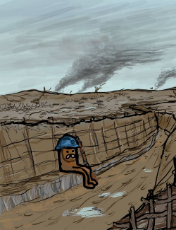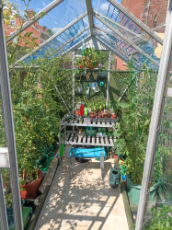How do I prepare for the future in this world? Some people buy gold or silver, but I don't believe that's going to be worth a single can of beans when the food shortages hit.
I have vacuum packed rice, pasta, and beans for a year already, but if the crisis is planned to last long enough to starve population to death, then holding on for a year or even two may not be enough for people to restart their own agriculture. If they even can anymore, or aren't stopped from doing so by force. And even if farmers got their fields started, even if government didn't stomp them out, I have busted legs so I couldn't do farm work to feed myself anyway.
And that's only if we don't get destroyed by a third world war first. I was already rejected from the military, so am I supposed to just abandon everything and flee the country with women and children? To Sweden, that already said no to taking Ukranian refugees? And is bound to be even worse screwed by food shortages AND roving bands of Somalian gangs? How do you even prepare for a future where you might have to abandon everything?
So, TL;DR: What do you think the future of Finland is going to be, and how should one prepare for it?
/mlpol/ - My Little Politics
Archived thread
>>348075
>And is bound to be even worse screwed by food shortages AND roving bands of Somalian gangs?
Ahem.
And who brought them? Who are protecting them?
That said, niggers are beasts, is their nature and cannot be changed; but the ones pretending to be on your team while conspiring to oppose you because it is their job description are the worst.
ID the real enemy among your kin, it may save your life.
>And is bound to be even worse screwed by food shortages AND roving bands of Somalian gangs?
Ahem.
And who brought them? Who are protecting them?
That said, niggers are beasts, is their nature and cannot be changed; but the ones pretending to be on your team while conspiring to oppose you because it is their job description are the worst.
ID the real enemy among your kin, it may save your life.
>>348075
>learn to hunt and fish. idc if you have to wheel yourself to the river and/or forest. at least try. when everyone else poaches everything to near-extinction, you'll wish you had some reindeer jerky.
>stockpile medicine and medical tools. antiparasitics, antibiotics, suture and limb setting equipment, etc... if you can't get it otc, consider getting the veterinary equivalent. knowing how to set a broken limb, pull a bad tooth, suture a wound, and set broken limbs can be extremely useful to yourself and to others. they'll be so grateful that you healed them, they'll totally suck your cock. close your eyes and pretend they're mares or you're ngmi.
>learn how to use power tools. learn how to weld and machine metal, too. basic manufacturing and carpentry skills will be very valuable.
>grow your own food as much as possible. learn how to pickle or dehydrate it. brewing your own liquor could also be useful since it can function as both a painkiller and an antiseptic.
>get a gun or build one. it's not that hard to make a sten or a slam fire shotgun.
>no more "but i'm crippled" bullshit. your depression is temporary. triumphing over adversity and loving mares is eternal. you sound like you feel powerless, stop it. you can do it, simo.
>precious metals, essentials that that would be difficult to obtain under an economic collapse (cars, guns, generators, fuel, etc.), and your own skill sets can save your ass if fiat finally takes a shit and dies.
>use your newfound skills to obtain a white woman. only have sex with her for procreation and don't let her corrupt you like a pussy. women are for laughing at and making white babies with only. only MARES are for love.
Congratulations, you'll be the king of the Wastes. Be sure to genocide New Somalia once you win. Or don't, nothing really matters.
>learn to hunt and fish. idc if you have to wheel yourself to the river and/or forest. at least try. when everyone else poaches everything to near-extinction, you'll wish you had some reindeer jerky.
>stockpile medicine and medical tools. antiparasitics, antibiotics, suture and limb setting equipment, etc... if you can't get it otc, consider getting the veterinary equivalent. knowing how to set a broken limb, pull a bad tooth, suture a wound, and set broken limbs can be extremely useful to yourself and to others. they'll be so grateful that you healed them, they'll totally suck your cock. close your eyes and pretend they're mares or you're ngmi.
>learn how to use power tools. learn how to weld and machine metal, too. basic manufacturing and carpentry skills will be very valuable.
>grow your own food as much as possible. learn how to pickle or dehydrate it. brewing your own liquor could also be useful since it can function as both a painkiller and an antiseptic.
>get a gun or build one. it's not that hard to make a sten or a slam fire shotgun.
>no more "but i'm crippled" bullshit. your depression is temporary. triumphing over adversity and loving mares is eternal. you sound like you feel powerless, stop it. you can do it, simo.
>precious metals, essentials that that would be difficult to obtain under an economic collapse (cars, guns, generators, fuel, etc.), and your own skill sets can save your ass if fiat finally takes a shit and dies.
>use your newfound skills to obtain a white woman. only have sex with her for procreation and don't let her corrupt you like a pussy. women are for laughing at and making white babies with only. only MARES are for love.
Congratulations, you'll be the king of the Wastes. Be sure to genocide New Somalia once you win. Or don't, nothing really matters.
1657923345_1.png (356.9 KB, 1280x831, FB22E01D53BD2EE58AB7EAF5B4F8160C-365460.png)

1657923345_2.jpg (213.5 KB, 1194x921, 429E026DD19077F0220439B635F1734F-218598.jpg)

1657923345_3.png (672.5 KB, 1280x1280, AF49FD97CAAAE403D1D32039BFD7A46C-688626.png)

>>348075
The highest transactional thing is capacity to enact change of some sort. More change the object/skill can do the more important it is.
Ammo and aimming and the situation impact the high value of ammunition which has a high value of change with a catalyst.
Something 'intangible' is strengthening your will. Magic and prayer works, like a card house knowing what is being delt with and the factors at play allow you to construct things and destruct things in an effective manner.
Yet another important thing is educating others, especially the youth. That can be sharing stories, myths, experiences, the light inside you and caring.
You are not alone. Play to your strengths if you don't know what those are create them or find them. If neither is possible cover your weaknesses.
Gather knowledge and wisdoms. Showing and telling why and how something is important is vital.
The highest transactional thing is capacity to enact change of some sort. More change the object/skill can do the more important it is.
Ammo and aimming and the situation impact the high value of ammunition which has a high value of change with a catalyst.
Something 'intangible' is strengthening your will. Magic and prayer works, like a card house knowing what is being delt with and the factors at play allow you to construct things and destruct things in an effective manner.
Yet another important thing is educating others, especially the youth. That can be sharing stories, myths, experiences, the light inside you and caring.
You are not alone. Play to your strengths if you don't know what those are create them or find them. If neither is possible cover your weaknesses.
Gather knowledge and wisdoms. Showing and telling why and how something is important is vital.
Lot of people focus on the pure survival aspect of crisis prep, but also don't neglect items that are useful in a secondary way.
I'm taking about office supplies like paper, pencils/pens, erasers, folders and binders. A solar-powered calculator.
Also stock items with entertainment value such as playing cards, dice, fiction books. Doesn't matter what kind of situation you're in, nobody can work 24/7. And if you're stuck in a bunker or shelter, you'll thank yourself for those cards when you don't die of boredom. Might help you make friends too.
I'm taking about office supplies like paper, pencils/pens, erasers, folders and binders. A solar-powered calculator.
Also stock items with entertainment value such as playing cards, dice, fiction books. Doesn't matter what kind of situation you're in, nobody can work 24/7. And if you're stuck in a bunker or shelter, you'll thank yourself for those cards when you don't die of boredom. Might help you make friends too.
1657947796.jpg (66.6 KB, 500x650, F7CC1B01E1E616C4B8B3A9ABE41D6735-68193.jpg)

>>348111
This is very true.
Entertainment and not destructive means of relaxing and recuperating is important too.
Clothing that you enjoy being in for long periods of time for all if not most activities is a good thing to have.
Spices, and sweets. Food that is hard to get a hold of and can last/ you'll have when shit hits the fan. Being comfortable, either warm or cool. Also hobbies such as music, writing, drawing, or anything else.
Maybe have lucid dreaming stuff in print/ on hand as a long term goal.
Ooo stock up on Ponies and Memes and entertainment you enjoy. Also things you may not enjoy as being a library of storts is also a trade you can do.
Things you would be willing to trade because others didn't have the foresight. Small cheap zippo lighters (lots means trading potential),
While this is degenerate it is a good time to stock up on adult materials, books, pictures, videos, magazines, printed on printer paper. Various medicines, condoms, various things to block/prevent pregnancy (they happen to induce varous hormones, and a nefarious person would combine a cocktail rendering a person into a zombie like state. Remember back through the nose toward the brain if bruised makes a person more submissive, ancient Egyptian technique). Recreational things such as alcohol and the like is also on the list.
Depends on how fucked things get. Prisons may not be an option, yet manpower is a vital resource. (((They))) openly state how they will go about doing these things. But when seriously contemplating 'end of the world' how far is too far, and what lengths are theoretically an option in varous survival games such as modded minecraft.
Becareful knowledge and ability with wisdom stops and maybe prevents tragedies.
Oh and sharpening and honing stone(s) would be nice to have.
Just having awesome stuff means high value target. Paranoia is a slow killer of the mind however.
This is very true.
Entertainment and not destructive means of relaxing and recuperating is important too.
Clothing that you enjoy being in for long periods of time for all if not most activities is a good thing to have.
Spices, and sweets. Food that is hard to get a hold of and can last/ you'll have when shit hits the fan. Being comfortable, either warm or cool. Also hobbies such as music, writing, drawing, or anything else.
Maybe have lucid dreaming stuff in print/ on hand as a long term goal.
Ooo stock up on Ponies and Memes and entertainment you enjoy. Also things you may not enjoy as being a library of storts is also a trade you can do.
Things you would be willing to trade because others didn't have the foresight. Small cheap zippo lighters (lots means trading potential),
While this is degenerate it is a good time to stock up on adult materials, books, pictures, videos, magazines, printed on printer paper. Various medicines, condoms, various things to block/prevent pregnancy (they happen to induce varous hormones, and a nefarious person would combine a cocktail rendering a person into a zombie like state. Remember back through the nose toward the brain if bruised makes a person more submissive, ancient Egyptian technique). Recreational things such as alcohol and the like is also on the list.
Depends on how fucked things get. Prisons may not be an option, yet manpower is a vital resource. (((They))) openly state how they will go about doing these things. But when seriously contemplating 'end of the world' how far is too far, and what lengths are theoretically an option in varous survival games such as modded minecraft.
Becareful knowledge and ability with wisdom stops and maybe prevents tragedies.
Oh and sharpening and honing stone(s) would be nice to have.
Just having awesome stuff means high value target. Paranoia is a slow killer of the mind however.
>>348130
>nefarious person would combine a cocktail rendering a person into a zombie like state. Remember back through the nose toward the brain if bruised makes a person more submissive
Jeffrey Dahmer posting from beyond the grave.
Anyway, here's a link to where you can get your supply of MARES.
https://m.wcostream.com/anime/my-little-pony-friendship-is-magic
>nefarious person would combine a cocktail rendering a person into a zombie like state. Remember back through the nose toward the brain if bruised makes a person more submissive
Jeffrey Dahmer posting from beyond the grave.
Anyway, here's a link to where you can get your supply of MARES.
https://m.wcostream.com/anime/my-little-pony-friendship-is-magic
>>348078
>>348103
>>348103
>>348111
>>348130
Thanks for the replies. I am decent at carpentry, welding and repairs, and some skill in repairing clothes as well. However, I don't think the world is going to end in some kind of happening where most skilled craftsmen are wiped out - rather there will be tons of unemployed people because you can live without a lot of material goods but not without food and shelter.
I have more than food stored, including things toothbrushes and soaps. It was actually funny when people started panic buying toilet paper and I already had a full stockpile at home. Also vitamins, basic medicines, and plenty of pens and paper to draw ponies with. Also printed porn if electricity goes out, but in a cold country lack of entertainment is far from the biggest problem with power shortages.
And while we still have electricity AND internet, I recommend everyone to save what you can. Storage capacity is so cheap that there is no justifiable reason to leave your favorite games and videos up to the whims of fickle corporations.
>>348103
>>348103
>>348111
>>348130
Thanks for the replies. I am decent at carpentry, welding and repairs, and some skill in repairing clothes as well. However, I don't think the world is going to end in some kind of happening where most skilled craftsmen are wiped out - rather there will be tons of unemployed people because you can live without a lot of material goods but not without food and shelter.
I have more than food stored, including things toothbrushes and soaps. It was actually funny when people started panic buying toilet paper and I already had a full stockpile at home. Also vitamins, basic medicines, and plenty of pens and paper to draw ponies with. Also printed porn if electricity goes out, but in a cold country lack of entertainment is far from the biggest problem with power shortages.
And while we still have electricity AND internet, I recommend everyone to save what you can. Storage capacity is so cheap that there is no justifiable reason to leave your favorite games and videos up to the whims of fickle corporations.
>>348130
>Spices
So very this. Booz and TP and shit like that are obvious hoarde-and-barter, but 6 months into destabilization, dry spices will be like GOLD. And, spices are alot easier to farm than produce
>Spices
So very this. Booz and TP and shit like that are obvious hoarde-and-barter, but 6 months into destabilization, dry spices will be like GOLD. And, spices are alot easier to farm than produce
>have tiny garden with decent sun
>landlord says no animals of any kind including chicken or fish
How farm food?
>landlord says no animals of any kind including chicken or fish
How farm food?
>>348155
Well just do vegetables then. If you haven't got much horizontal space then get ones that can be grown vertically. At the moment I'm growing tomatoes and I recently harvested my peas I started growing a while back. The tomatoes need staking if you are making then grow tall and the peas can be grown to climb up netting if you make either a frame for them or hang the netting off of a wall.
It may be too late to plant things like that now but take a look at what you can get from garden centres or places like B&Q for some pre grown veg plants if you want blto get a quick crash course in it since some plants are harder to grow from seed (My strawberries are all grown from extensions coming off my original plants since germinating them is really hit or miss.)
Maybe I should make more posts on my shit tier growing habits? Also pic related is my current setup in my free space
Well just do vegetables then. If you haven't got much horizontal space then get ones that can be grown vertically. At the moment I'm growing tomatoes and I recently harvested my peas I started growing a while back. The tomatoes need staking if you are making then grow tall and the peas can be grown to climb up netting if you make either a frame for them or hang the netting off of a wall.
It may be too late to plant things like that now but take a look at what you can get from garden centres or places like B&Q for some pre grown veg plants if you want blto get a quick crash course in it since some plants are harder to grow from seed (My strawberries are all grown from extensions coming off my original plants since germinating them is really hit or miss.)
Maybe I should make more posts on my shit tier growing habits? Also pic related is my current setup in my free space
>>348155
Apple trees are the most space efficient method of growing food, but they need more time to grow than we probably have. If I remember correctly, either corn or potatoes are the second most efficient, but in any case a home garden is at most going to produce fresh vegetables to add to your diet. Actually sustaining yourself around the year needs more land than 99% of modern people have.
Apple trees are the most space efficient method of growing food, but they need more time to grow than we probably have. If I remember correctly, either corn or potatoes are the second most efficient, but in any case a home garden is at most going to produce fresh vegetables to add to your diet. Actually sustaining yourself around the year needs more land than 99% of modern people have.
>>348160
2 adult humans require 0.4 acres of arable land to survive on. Average 4 hours of work each day, per person for maintenance. Include the amount of work needed to divert or store water: another 1-8 hours depending on ease of access to water. Add 10-16 hours per day during harvesting, processing, preserving, and storing. Add another 0.1 acre for every teenager or 2 children; with that aid remove 4 or 2 hours per day from the adult workload. What do you end up with? A clusterfuck. Mind you that is ONLY basic survival.
Now let's go up a notch: 4 adult humans will require 0.9 acre of arable land, with 2-3 hours of work each day between them, and 2-3 hours of water maintenance for 2 persons. You can see how quickly scaling a farm community upwards becomes. Let's say there's 3 teenagers and 6 children: this leaves the adults 5-6 hours more time per day to work on other projects and tasks.
That is, until you reach the 3 Problems:
#1: "space is at a premium, we have X people with Y accommodations, and there isn't enough time/knowledge/skill/tools to build more". This is the most common one, due to either shortsightedness, lack of education and real world experience, pressure, or being in a shitty area. How to resolve this? There's a famous quote that I enjoy stating often: "Any idiot or moron can build a bridge that lasts a thousand years given all the materials and time he needs. On the other hand, it takes a true genius to design a bridge that will only last twenty years." In short: overbuild. everything. No shitty little 1-room house made of single-stacked logs, make that fucker a fortress of triple-layered logs and externally protection by a mountain of form-fit stones.
#2: "we don't have enough water!" Can't change weather patterns unless you know how cloud seeding methods. Not enough water? Reduce number of crops. Too much water? Add a small amount of sand to the soil for additional drainage. Flooding constantly? You picked the wrong location.
#3: "we can't expand more because we don't have more arable land". The third most common and least understood. You cannot simply expect to plant a seed and water it. Certain crops will take a few years to adapt to even marginal changes from their native spread, so long as you let them wild seed and spread on their own without 'aid'. Others will not grow anywhere save for a tiny region. Be selective, study the potentials, be aware of problems such as parasites, bacterium, fungi, and what will, or may, prey on select crops. Also: ROTATE YOUR FUCKING CROPS. """Modern""" monoculture methods have fucked over the vast majority of commercially farmed land, so don't even try.
#4: arguably both the least and most major problem to consider is whether or not you will be planting genetically engineered crops. Main liability with those is that the vast majority have been engineered to REQUIRE doses of glyphosate in order to sprout. If you've been 'spraying' for years or you decide to take over a place, guess what: that soil is heavily contaminated. Takes over 5 years for that shit, among other herbicides, to BEGIN breaking down. You will not realize this immediately, though common signs are a lack of certain flora not growing in the vicinity.
As for fruit trees... do NOT depend on them for 'efficiency' unless you've selected a hardy Old World variety. Most are water hogs. If they don't get enough you will have wasted time, space, and water over several years that could have been used for another crop. A firmly established fruit tree can provide a reasonable amount of fresh and preserved food for at most 4-5 people, all depending on species, height, and difficulty acquiring. Don't plant exotic fruit trees unless you have studied their needs.
Nut trees and fruit-bearing vines have the same problems as above, except they are targeted more by birds and insects. Walnuts are infamous for this, as are almonds, watermelons, cantaloupe, etc. etc. etc.
2 adult humans require 0.4 acres of arable land to survive on. Average 4 hours of work each day, per person for maintenance. Include the amount of work needed to divert or store water: another 1-8 hours depending on ease of access to water. Add 10-16 hours per day during harvesting, processing, preserving, and storing. Add another 0.1 acre for every teenager or 2 children; with that aid remove 4 or 2 hours per day from the adult workload. What do you end up with? A clusterfuck. Mind you that is ONLY basic survival.
Now let's go up a notch: 4 adult humans will require 0.9 acre of arable land, with 2-3 hours of work each day between them, and 2-3 hours of water maintenance for 2 persons. You can see how quickly scaling a farm community upwards becomes. Let's say there's 3 teenagers and 6 children: this leaves the adults 5-6 hours more time per day to work on other projects and tasks.
That is, until you reach the 3 Problems:
#1: "space is at a premium, we have X people with Y accommodations, and there isn't enough time/knowledge/skill/tools to build more". This is the most common one, due to either shortsightedness, lack of education and real world experience, pressure, or being in a shitty area. How to resolve this? There's a famous quote that I enjoy stating often: "Any idiot or moron can build a bridge that lasts a thousand years given all the materials and time he needs. On the other hand, it takes a true genius to design a bridge that will only last twenty years." In short: overbuild. everything. No shitty little 1-room house made of single-stacked logs, make that fucker a fortress of triple-layered logs and externally protection by a mountain of form-fit stones.
#2: "we don't have enough water!" Can't change weather patterns unless you know how cloud seeding methods. Not enough water? Reduce number of crops. Too much water? Add a small amount of sand to the soil for additional drainage. Flooding constantly? You picked the wrong location.
#3: "we can't expand more because we don't have more arable land". The third most common and least understood. You cannot simply expect to plant a seed and water it. Certain crops will take a few years to adapt to even marginal changes from their native spread, so long as you let them wild seed and spread on their own without 'aid'. Others will not grow anywhere save for a tiny region. Be selective, study the potentials, be aware of problems such as parasites, bacterium, fungi, and what will, or may, prey on select crops. Also: ROTATE YOUR FUCKING CROPS. """Modern""" monoculture methods have fucked over the vast majority of commercially farmed land, so don't even try.
#4: arguably both the least and most major problem to consider is whether or not you will be planting genetically engineered crops. Main liability with those is that the vast majority have been engineered to REQUIRE doses of glyphosate in order to sprout. If you've been 'spraying' for years or you decide to take over a place, guess what: that soil is heavily contaminated. Takes over 5 years for that shit, among other herbicides, to BEGIN breaking down. You will not realize this immediately, though common signs are a lack of certain flora not growing in the vicinity.
As for fruit trees... do NOT depend on them for 'efficiency' unless you've selected a hardy Old World variety. Most are water hogs. If they don't get enough you will have wasted time, space, and water over several years that could have been used for another crop. A firmly established fruit tree can provide a reasonable amount of fresh and preserved food for at most 4-5 people, all depending on species, height, and difficulty acquiring. Don't plant exotic fruit trees unless you have studied their needs.
Nut trees and fruit-bearing vines have the same problems as above, except they are targeted more by birds and insects. Walnuts are infamous for this, as are almonds, watermelons, cantaloupe, etc. etc. etc.
>>348158
>Maybe I should make more posts on my shit tier growing habits?
Why not start a gardening thread in /üb/?
>Maybe I should make more posts on my shit tier growing habits?
Why not start a gardening thread in /üb/?
>>348173
Thanks! This was some very useful information on many of the caveats most people don't think of. I for one would have never known how the GMO crops are different from my childhood, so any fields that have been active recently must be beginners traps for new farmers once the pesticides run out.
Sadly, that means my town, even surrounded by fields, is going to be even worse off than I thought. And now I feel more blackpilled than ever. Is there anything I can do or should I just kill myself with booze and junkfood before it's too late even for that? I can't go on living like this.
Thanks! This was some very useful information on many of the caveats most people don't think of. I for one would have never known how the GMO crops are different from my childhood, so any fields that have been active recently must be beginners traps for new farmers once the pesticides run out.
Sadly, that means my town, even surrounded by fields, is going to be even worse off than I thought. And now I feel more blackpilled than ever. Is there anything I can do or should I just kill myself with booze and junkfood before it's too late even for that? I can't go on living like this.
>>348202
The rough goal is near about the same.
Get a garden if possible. When those plants are done growing keep the seeds ready.
The rough goal is near about the same.
Get a garden if possible. When those plants are done growing keep the seeds ready.
>>348203
I live in an apartment building so a home garden is impossible. And even if it wasn't you'd need a LOT of space to actually live on. And that's not even taking into account the possibility of crop failures and other pitfalls that farmers have to deal with.
This picture gives some tips, but I don't know how reliable it is, in addition to clearly not being made for Finnish climate in the first place. Sunlight alone is nonexistent in winter, and farm animals don't survive without a shelter. And that's all assuming the government didn't just stop you from farming anyway.
I live in an apartment building so a home garden is impossible. And even if it wasn't you'd need a LOT of space to actually live on. And that's not even taking into account the possibility of crop failures and other pitfalls that farmers have to deal with.
This picture gives some tips, but I don't know how reliable it is, in addition to clearly not being made for Finnish climate in the first place. Sunlight alone is nonexistent in winter, and farm animals don't survive without a shelter. And that's all assuming the government didn't just stop you from farming anyway.
>>348205
I've heard good things (and times with catastrophic failure) about home grown mushrooms.
Particularly good things about oyster mushrooms.
Inna five gallon bucket, jar or bag with wood pellets/shavings/petfillerstuff/coffee grounds. Just needs humidity and a bit of ventilation to remove the co2 it outputs.
A growlight(LED or not) might be a choice for a while.
But in tightly spaced areas with high amounts of people aspects to consider is cooperation and security.
Keep in mind if shit hits the fan many 'jobs' are possible that would improve the quality of life. Record keepers, contract verifiers, conflict resolvers and what else.
There are only so many man hours in a day.
I've heard good things (and times with catastrophic failure) about home grown mushrooms.
Particularly good things about oyster mushrooms.
Inna five gallon bucket, jar or bag with wood pellets/shavings/petfillerstuff/coffee grounds. Just needs humidity and a bit of ventilation to remove the co2 it outputs.
A growlight(LED or not) might be a choice for a while.
But in tightly spaced areas with high amounts of people aspects to consider is cooperation and security.
Keep in mind if shit hits the fan many 'jobs' are possible that would improve the quality of life. Record keepers, contract verifiers, conflict resolvers and what else.
There are only so many man hours in a day.
>>348202
Killing yourself is exactly what they want. Don't let the inconvenience of life push you into despair. Always remember that where there is hardship, there is opportunity. Think of how many urbanites are out there with no marketable skills at all in a crisis situation.
If you have a good work ethic and can work with your hands, you'll find plenty of ways to be useful to your community during a crisis.
Killing yourself is exactly what they want. Don't let the inconvenience of life push you into despair. Always remember that where there is hardship, there is opportunity. Think of how many urbanites are out there with no marketable skills at all in a crisis situation.
If you have a good work ethic and can work with your hands, you'll find plenty of ways to be useful to your community during a crisis.
>>348202
No, and no. Roughly 70% of the easily accessible, commercially viable to farm, and (once cheap circa pre-2006) arable land in the Jew-S is screwed for the next 10+ years, pay attention to what grows where. If you don't see 'weeds', then it's fucked. By the way, check out any video on j00t00b on wild edibles, you'll be quite surprised on what is and what is not actually a 'weed'. Dandelions, purslane, sheepswort, and hundreds more are perfectly safe to eat, so long as you know what to look for.
As for killing yourself, no. Ever heard of the 'crab reflex'? If not, it means go down fighting while causing the most damage possible. Force those that want you dead to suffer such agony that they will scream in constant fear at your memory. Go not silently, easily, nor ever.
No, and no. Roughly 70% of the easily accessible, commercially viable to farm, and (once cheap circa pre-2006) arable land in the Jew-S is screwed for the next 10+ years, pay attention to what grows where. If you don't see 'weeds', then it's fucked. By the way, check out any video on j00t00b on wild edibles, you'll be quite surprised on what is and what is not actually a 'weed'. Dandelions, purslane, sheepswort, and hundreds more are perfectly safe to eat, so long as you know what to look for.
As for killing yourself, no. Ever heard of the 'crab reflex'? If not, it means go down fighting while causing the most damage possible. Force those that want you dead to suffer such agony that they will scream in constant fear at your memory. Go not silently, easily, nor ever.
1658227691.jpg (238.6 KB, 1344x756, cc2c2c57ebdf991847125cac5cace7a0.jpeg)

>>348075
>How do I prepare for the future in this world?
Listen to Max Igan, he is way ahead of the (((NWO))) wave and has very good advise imho.
>The Controlled Demolition of Everything
https://odysee.com/@thecrowhouse:2/The-Controlled-Demolition-of-Everything:e
Mirror:
https://www.bitchute.com/video/dry1BZWYE51n/
>How do I prepare for the future in this world?
Listen to Max Igan, he is way ahead of the (((NWO))) wave and has very good advise imho.
>The Controlled Demolition of Everything
https://odysee.com/@thecrowhouse:2/The-Controlled-Demolition-of-Everything:e
Mirror:
https://www.bitchute.com/video/dry1BZWYE51n/
>>348288
Did you find out about Max Igan thanks to your own browsing or did you find out from /furi/? I'm BD, and am curious if my postings there have had a positive effect elsewhere too.
Did you find out about Max Igan thanks to your own browsing or did you find out from /furi/? I'm BD, and am curious if my postings there have had a positive effect elsewhere too.
I've been looking into things some more, and apparently Finland may for the first time ever actually HAVE rolling blackouts during this winter. They should end in December IF the Olkiluoto nuclear plant gets finished and started without problems or delays, so while I've already bought a high-power UPS and a low-power laptop for temporary blackouts, I don't know how necessary buying solar panels for backup would be. Solar would be a good investment in general for anyone paying for their own electricity, but since utilities are included in rent where I live I wouldn't get anything out of them unless power really goes out for good.
>>348207
Mushroom farm seems like a possible solution if you can feed it with sawdust, but I hate mushrooms so I'd rather not farm them unless absolutely inevitable. Spirulina would be a preferable alternative, but any guides I've read on it either don't say anything about feeding it, or say that it needs sodium bicarbonate, potassium nitrate, calcium chloride, iron sulfate, magnesium sulfate, ammonium sulfate and citric acid. If things get bad enough that farming algae in your own apartment becomes necessary, you'd need a sustainable way to keep the spirulina fed.
Seriously though, how bad do you think things are likely to get, and for how long? Is this going to be the end of civilization, or just another year-long crisis to grab more political power and mortgaged houses? I see a lot of people talking about an irreversible collapse yet no one else seems to be taking it seriously.
>>348229
If the world collapses there's going to be thousands of highly-trained and experienced professionals desperate for work. And farm work would be the only one desperately needed - which as mentioned above I can't do, and which our contaminated fields couldn't support even if we somehow had insane stockpiles of non-GMO seeds standing by.
>>348284
What good does "crab reflex" do when you could sacrifice your life to fighting one person without ever seeing even the top half of his organization? Like when one ruined Youtuber went on a shooting spree at Google, killing some low level employees who aren't worth slaves for the corporation that replaced them without their bosses having to lift a finger about it. The only one who suffers from my continued existence is myself.
>>348288
That was more of a rant, with the only pieces of advice being "It's too late to stop and we just have to ride it out" and "don't get arrested for nothing." Necessary tips for some people, but I knew them both all too well already.
>>348207
Mushroom farm seems like a possible solution if you can feed it with sawdust, but I hate mushrooms so I'd rather not farm them unless absolutely inevitable. Spirulina would be a preferable alternative, but any guides I've read on it either don't say anything about feeding it, or say that it needs sodium bicarbonate, potassium nitrate, calcium chloride, iron sulfate, magnesium sulfate, ammonium sulfate and citric acid. If things get bad enough that farming algae in your own apartment becomes necessary, you'd need a sustainable way to keep the spirulina fed.
Seriously though, how bad do you think things are likely to get, and for how long? Is this going to be the end of civilization, or just another year-long crisis to grab more political power and mortgaged houses? I see a lot of people talking about an irreversible collapse yet no one else seems to be taking it seriously.
>>348229
If the world collapses there's going to be thousands of highly-trained and experienced professionals desperate for work. And farm work would be the only one desperately needed - which as mentioned above I can't do, and which our contaminated fields couldn't support even if we somehow had insane stockpiles of non-GMO seeds standing by.
>>348284
What good does "crab reflex" do when you could sacrifice your life to fighting one person without ever seeing even the top half of his organization? Like when one ruined Youtuber went on a shooting spree at Google, killing some low level employees who aren't worth slaves for the corporation that replaced them without their bosses having to lift a finger about it. The only one who suffers from my continued existence is myself.
>>348288
That was more of a rant, with the only pieces of advice being "It's too late to stop and we just have to ride it out" and "don't get arrested for nothing." Necessary tips for some people, but I knew them both all too well already.
>>348379
>That was more of a rant, with the only pieces of advice being...
You skipped the grow your own food part and try to get away from countries with infrastructure (surveillance and control).
>That was more of a rant, with the only pieces of advice being...
You skipped the grow your own food part and try to get away from countries with infrastructure (surveillance and control).
>>348385
Well, if you stay, your own NPC neighbors will drag you down, if not straight snitch on you.
Well, if you stay, your own NPC neighbors will drag you down, if not straight snitch on you.
1658404665_1.png (400.2 KB, 480x615, keep him busy with his basic needs.png)

1658404665_2.jpg (108.9 KB, 831x960, acutely aware of being a slave.jpg)

>>348388
I'm sure that emigrating is out of my comfort zone and the idea of living among non-Whites is revolting, that said, if things got to this level it is because of the normies. The non-Whites are normie tier x 10, but at this stage the jews are focused on destroying the industrial societies and turn them into a huge concentration camps, so a relief of at least 10 years might be expected before they expand to the poorest parts of the planet.
I'm sure that emigrating is out of my comfort zone and the idea of living among non-Whites is revolting, that said, if things got to this level it is because of the normies. The non-Whites are normie tier x 10, but at this stage the jews are focused on destroying the industrial societies and turn them into a huge concentration camps, so a relief of at least 10 years might be expected before they expand to the poorest parts of the planet.
1658406476_1.mp4 (12.8 MB, Resolution:854x480 Length:00:10:40, r34c7nt39cym389t938cta.mp4) [play once] [loop]

1658406476_2.jpg (72.0 KB, 582x582, 34nhgshigchiajjaozrhgaurhcndlk.jpg)

>>348389
>destroying the industrial societies and turn them into a huge concentration camps
In the States, the government has already everything in place to deploy UN's Agenda 2030, I believe in Europe they have their own versions of it.
In a nutshell, all personal in the government payroll are a threat, all normies around are potential collaborators. Yup, it is a full paranoid situation and indeed awkward, and yet, very real.
>destroying the industrial societies and turn them into a huge concentration camps
In the States, the government has already everything in place to deploy UN's Agenda 2030, I believe in Europe they have their own versions of it.
In a nutshell, all personal in the government payroll are a threat, all normies around are potential collaborators. Yup, it is a full paranoid situation and indeed awkward, and yet, very real.
This is an excellent thread, and thanks are given to the many anons and resources presented.
Imagine that with what is to come, whatever it may be, (you) will not survive.
NOT intended to discourage, more to point to an inevitability. The youngest among us MIGHT HAVE 80 years, otherwise unmolested. And yet, molestation has been priced in, and is a given.
It is important to make plans for how a person could/would live, but it is equally important to contemplate the hill(s) that one may be called upon to die on.
Such as, what one will tolerate until the point of violent resistance?
At such a point, what would seem to rightfully cause a cessation of violence?
One has a vested interest to look inward and decide where 'the line' is for then. Literally for some, it may mean deciding what they will die for, in the interest of dying with dignity and honor (if'n ye believe in such things).
Imagine that with what is to come, whatever it may be, (you) will not survive.
NOT intended to discourage, more to point to an inevitability. The youngest among us MIGHT HAVE 80 years, otherwise unmolested. And yet, molestation has been priced in, and is a given.
It is important to make plans for how a person could/would live, but it is equally important to contemplate the hill(s) that one may be called upon to die on.
Such as, what one will tolerate until the point of violent resistance?
At such a point, what would seem to rightfully cause a cessation of violence?
One has a vested interest to look inward and decide where 'the line' is for then. Literally for some, it may mean deciding what they will die for, in the interest of dying with dignity and honor (if'n ye believe in such things).
>>348380
Ah yes, forgot about that. But has he abandoned his life to go start a farm in a developing country? Hell, I'd like to know how ANYONE redpilled has actually done anything to prepare in general.
I have food, vitamins, medical and hygiene products, electricity, and an ever growing storage of games and content saved from the internet, but thus far it's all things that are going to have value even if the collapse won't be as total as I fear. I'm not too eager to abandon my home and life unless I'm absolutely certain of it's necessity, so how have you who ARE certain of the collapse prepared for it?
Ah yes, forgot about that. But has he abandoned his life to go start a farm in a developing country? Hell, I'd like to know how ANYONE redpilled has actually done anything to prepare in general.
I have food, vitamins, medical and hygiene products, electricity, and an ever growing storage of games and content saved from the internet, but thus far it's all things that are going to have value even if the collapse won't be as total as I fear. I'm not too eager to abandon my home and life unless I'm absolutely certain of it's necessity, so how have you who ARE certain of the collapse prepared for it?
1658456783.jpg (34.9 KB, 308x337, 0A2AA97C264D549BD5D132915794EE99-35768.jpg)

>>348294
>Did you find out about Max Igan thanks to your own browsing or did you find out from /furi/?
Browsing and it was like 5 years ago.
>Did you find out about Max Igan thanks to your own browsing or did you find out from /furi/?
Browsing and it was like 5 years ago.
1658462972.png (207.9 KB, 713x541, 0EF0F2FDA4392494D3E98CD8FDA55035-212851.png)

They can't take the Equestria in our hearts away.
>>348401
To clarify on the electricity part, I now have a 150W solar panel and a 30W per hour laptop, so there should be enough power for entertainment and reading saved information even during the darkest days of winter.
Also, at the moment lentils seem like a perfect crop if you have the space to farm it with. Not only does it contain enough protein and vitamins that you could survive on it alone, but as it matures the seeds dry by themselves, making for very easy storage. But most of all, because the lentil seeds are what you get from food stores already, they haven't run out yet like soy bean seeds have when farmers started switching from corn to it.
I also found a long since abandoned field within one fuel tank's drive from my home, with a river of fresh water nearby too. Still, I have yet to find proper instructions on growing lentils on a massive scale, or how to do farming without machinery in general. Here's what I've found, but poking the seeds underground one by one can't possibly be how you farm several acres of land:
"Sow lentil seeds 1 t0 1½ inches deep, deeper if the soil is dry and space seeds 1 inch apart. Space rows 18 to 24 inches apart. Keep the soil where lentils grow evenly moist. Do not water lentils once pods have begun to dry near harvest time."
To clarify on the electricity part, I now have a 150W solar panel and a 30W per hour laptop, so there should be enough power for entertainment and reading saved information even during the darkest days of winter.
Also, at the moment lentils seem like a perfect crop if you have the space to farm it with. Not only does it contain enough protein and vitamins that you could survive on it alone, but as it matures the seeds dry by themselves, making for very easy storage. But most of all, because the lentil seeds are what you get from food stores already, they haven't run out yet like soy bean seeds have when farmers started switching from corn to it.
I also found a long since abandoned field within one fuel tank's drive from my home, with a river of fresh water nearby too. Still, I have yet to find proper instructions on growing lentils on a massive scale, or how to do farming without machinery in general. Here's what I've found, but poking the seeds underground one by one can't possibly be how you farm several acres of land:
"Sow lentil seeds 1 t0 1½ inches deep, deeper if the soil is dry and space seeds 1 inch apart. Space rows 18 to 24 inches apart. Keep the soil where lentils grow evenly moist. Do not water lentils once pods have begun to dry near harvest time."
37 replies | 25 files | 19 UUIDs | Archived
![967229[1].jpg](/images/thumb/74C8DB61C722EB2787A7FEF0B10CCFAE-553085.png)


![569812[1].jpg](/images/thumb/1C59C6D18BDFC9D69C711F1E2F73604B-29191.png)






![1265140__safe_artist-colon-mistermech_oc_oc+only_oc-colon-greaser_oc-colon-mach_pegasus_pony_unicorn_fallout+equestria-colon-+outlaw_blushing_boots_clothes[1].jpg](/images/thumb/D7B745FEBA1CDE9A9DB62F034697AB42-1318741.png)

![1200px-3_types_of_lentil[1].png](/images/thumb/2CE40B17C455D078DBD73D51FD529ABC-1262772.png)

 Ex: Type :littlepip: to add Littlepip
Ex: Type :littlepip: to add Littlepip  Ex: Type :eqg-rarity: to add EqG Rarity
Ex: Type :eqg-rarity: to add EqG Rarity 